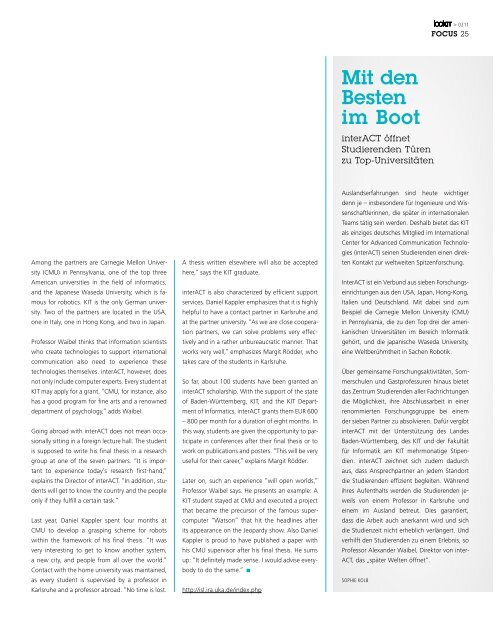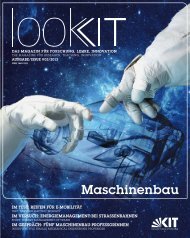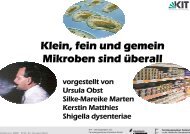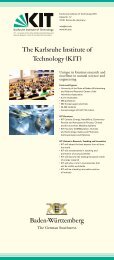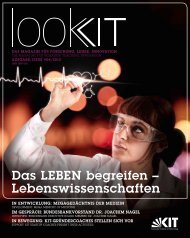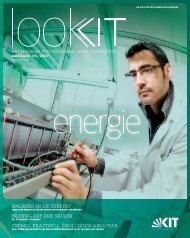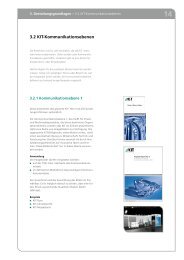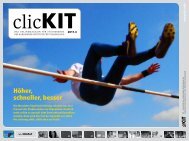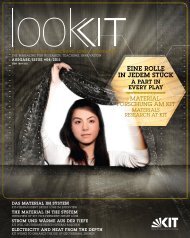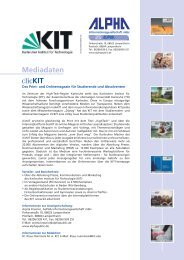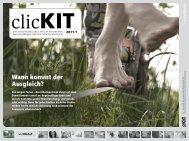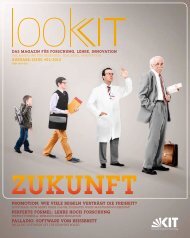lookKIT 02/2011 - PKM - KIT
lookKIT 02/2011 - PKM - KIT
lookKIT 02/2011 - PKM - KIT
Erfolgreiche ePaper selbst erstellen
Machen Sie aus Ihren PDF Publikationen ein blätterbares Flipbook mit unserer einzigartigen Google optimierten e-Paper Software.
<strong>02</strong>11<br />
Focus 25<br />
Mit den<br />
Besten<br />
im Boot<br />
interACT öffnet<br />
Studierenden Türen<br />
zu Top-Universitäten<br />
Among the partners are Carnegie Mellon University<br />
(CMU) in Pennsylvania, one of the top three<br />
American universities in the field of informatics,<br />
and the Japanese Waseda University, which is famous<br />
for robotics. <strong>KIT</strong> is the only German university.<br />
Two of the partners are located in the USA,<br />
one in Italy, one in Hong Kong, and two in Japan.<br />
Professor Waibel thinks that information scientists<br />
who create technologies to support international<br />
communication also need to experience these<br />
technologies themselves. interACT, however, does<br />
not only include computer experts. Every student at<br />
<strong>KIT</strong> may apply for a grant. “CMU, for instance, also<br />
has a good program for fine arts and a renowned<br />
department of psychology,” adds Waibel.<br />
Going abroad with interACT does not mean occasionally<br />
sitting in a foreign lecture hall. The student<br />
is supposed to write his final thesis in a research<br />
group at one of the seven partners. “It is important<br />
to experience today’s research first-hand,”<br />
explains the Director of interACT. “In addition, students<br />
will get to know the country and the people<br />
only if they fulfill a certain task.”<br />
Last year, Daniel Kappler spent four months at<br />
CMU to develop a grasping scheme for robots<br />
within the framework of his final thesis. “It was<br />
very interesting to get to know another system,<br />
a new city, and people from all over the world.”<br />
Contact with the home university was maintained,<br />
as every student is supervised by a professor in<br />
Karlsruhe and a professor abroad. “No time is lost.<br />
A thesis written elsewhere will also be accepted<br />
here,” says the <strong>KIT</strong> graduate.<br />
interACT is also characterized by efficient support<br />
services. Daniel Kappler emphasizes that it is highly<br />
helpful to have a contact partner in Karlsruhe and<br />
at the partner university. “As we are close cooperation<br />
partners, we can solve problems very effectively<br />
and in a rather unbureaucratic manner. That<br />
works very well,” emphasizes Margit Rödder, who<br />
takes care of the students in Karlsruhe.<br />
So far, about 100 students have been granted an<br />
interACT scholarship. With the support of the state<br />
of Baden-Württemberg, <strong>KIT</strong>, and the <strong>KIT</strong> Department<br />
of Informatics, interACT grants them EUR 600<br />
– 800 per month for a duration of eight months. In<br />
this way, students are given the opportunity to participate<br />
in conferences after their final thesis or to<br />
work on publications and posters. ”This will be very<br />
useful for their career,” explains Margit Rödder.<br />
Later on, such an experience “will open worlds,”<br />
Professor Waibel says. He presents an example: A<br />
<strong>KIT</strong> student stayed at CMU and executed a project<br />
that became the precursor of the famous supercomputer<br />
“Watson” that hit the headlines after<br />
its appearance on the Jeopardy show. Also Daniel<br />
Kappler is proud to have published a paper with<br />
his CMU supervisor after his final thesis. He sums<br />
up: “It definitely made sense. I would advise everybody<br />
to do the same.”<br />
http://isl.ira.uka.de/index.php<br />
Auslandserfahrungen sind heute wichtiger<br />
denn je – insbesondere für Ingenieure und Wissenschaftlerinnen,<br />
die später in internationalen<br />
Teams tätig sein werden. Deshalb bietet das <strong>KIT</strong><br />
als einziges deutsches Mitglied im International<br />
Center for Advanced Communication Technologies<br />
(interACT) seinen Studierenden einen direkten<br />
Kontakt zur weltweiten Spitzenforschung.<br />
InterACT ist ein Verbund aus sieben Forschungseinrichtungen<br />
aus den USA, Japan, Hong-Kong,<br />
Italien und Deutschland. Mit dabei sind zum<br />
Beispiel die Carnegie Mellon University (CMU)<br />
in Pennsylvania, die zu den Top drei der amerikanischen<br />
Universitäten im Bereich Informatik<br />
gehört, und die japanische Waseda University,<br />
eine Weltberühmtheit in Sachen Robotik.<br />
Über gemeinsame Forschungsaktivitäten, Sommerschulen<br />
und Gastprofessuren hinaus bietet<br />
das Zentrum Studierenden aller Fachrichtungen<br />
die Möglichkeit, ihre Abschlussarbeit in einer<br />
renommierten Forschungsgruppe bei einem<br />
der sieben Partner zu absolvieren. Dafür vergibt<br />
interACT mit der Unterstützung des Landes<br />
Baden-Württemberg, des <strong>KIT</strong> und der Fakultät<br />
für Informatik am <strong>KIT</strong> mehrmonatige Stipendien.<br />
interACT zeichnet sich zudem dadurch<br />
aus, dass Ansprechpartner an jedem Standort<br />
die Studierenden effizient begleiten. Während<br />
ihres Aufenthalts werden die Studierenden jeweils<br />
von einem Professor in Karlsruhe und<br />
einem im Ausland betreut. Dies garantiert,<br />
dass die Arbeit auch anerkannt wird und sich<br />
die Studienzeit nicht erheblich verlängert. Und<br />
verhilft den Studierenden zu einem Erlebnis, so<br />
Professor Alexander Waibel, Direktor von inter-<br />
ACT, das „später Welten öffnet“.<br />
Sophie Kolb


